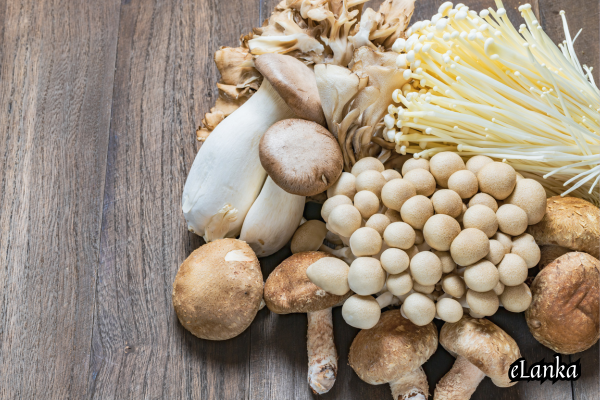The Incredible Health Benefits of Mushrooms: A Natural Superfood – By Nadeeka – eLanka

Mushrooms, often considered a superfood, have been a staple in human diets for centuries due to their rich nutritional profile and numerous health benefits. From ancient Chinese medicine to modern culinary practices, mushrooms have earned their place as a versatile and health-boosting ingredient. Packed with essential nutrients, antioxidants, and bioactive compounds, they offer a variety of advantages that contribute to overall well-being.
Mushrooms are a low-calorie food that provides a wealth of nutrients, making them an excellent addition to any diet. They are rich in vitamins such as B vitamins, including riboflavin, niacin, and pantothenic acid, which play a critical role in energy production and maintaining a healthy nervous system. Additionally, mushrooms are one of the few plant-based sources of vitamin D, especially when exposed to sunlight or ultraviolet light during growth. This makes them particularly valuable for individuals with limited sun exposure or dietary sources of vitamin D.
Another key benefit of mushrooms lies in their antioxidant properties. They are abundant in selenium, a mineral that supports immune function and helps protect cells from oxidative stress. The presence of ergothioneine, a unique antioxidant found almost exclusively in mushrooms, further enhances their ability to neutralize harmful free radicals in the body. By combating oxidative stress, mushrooms contribute to reducing inflammation, slowing down the aging process, and lowering the risk of chronic diseases such as cancer and heart disease.
Mushrooms are also recognized for their potential to boost immune health. Beta-glucans, a type of polysaccharide found in mushrooms, have been shown to stimulate the immune system, enhancing the body’s ability to fight off infections and illnesses. This immune-modulating property is particularly beneficial during seasonal changes or times of increased vulnerability to colds and flu. Mushrooms like shiitake and maitake are especially known for their immune-supportive properties, making them popular choices in traditional and alternative medicine.
In addition to their immune-boosting capabilities, mushrooms can support heart health. They are naturally low in cholesterol, fat, and sodium, making them a heart-friendly food. The presence of compounds like beta-glucans and sterols in mushrooms has been linked to lowering cholesterol levels, thereby reducing the risk of cardiovascular diseases. Potassium, another nutrient found in mushrooms, helps regulate blood pressure by counteracting the effects of sodium and relaxing blood vessel walls.
For individuals managing diabetes or aiming to maintain stable blood sugar levels, mushrooms offer significant benefits. They have a low glycemic index, meaning they have minimal impact on blood sugar levels. Furthermore, the bioactive compounds in mushrooms may enhance insulin sensitivity, improving glucose regulation in the body. Including mushrooms in the diet can be a valuable strategy for preventing or managing type 2 diabetes.
Another remarkable benefit of mushrooms is their role in supporting gut health. Rich in prebiotics, mushrooms provide nourishment for beneficial gut bacteria, promoting a healthy microbiome. A balanced gut microbiome is crucial for efficient digestion, nutrient absorption, and a strong immune system. By fostering gut health, mushrooms contribute to overall digestive well-being and may reduce the risk of gastrointestinal disorders.
Mushrooms also show promise in supporting cognitive health. Some varieties, such as lion’s mane mushrooms, contain compounds that stimulate the production of nerve growth factor (NGF), a protein essential for the growth and maintenance of neurons. This property has sparked interest in the potential of mushrooms to enhance memory, concentration, and cognitive function. Preliminary studies suggest that mushrooms may play a role in preventing neurodegenerative diseases such as Alzheimer’s and Parkinson’s.
Weight management is another area where mushrooms excel. With their low calorie and high nutrient density, mushrooms provide a satisfying addition to meals without contributing to excessive calorie intake. Their high water and fiber content promote a feeling of fullness, reducing the likelihood of overeating. Incorporating mushrooms into a balanced diet can support healthy weight loss and maintenance efforts.
Mushrooms have also been found to possess anti-cancer properties. Certain varieties, such as reishi and turkey tail mushrooms, contain bioactive compounds that may inhibit the growth of cancer cells and enhance the body’s natural defense mechanisms. While research is ongoing, these findings highlight the potential of mushrooms as a complementary approach to cancer prevention and treatment.
Incorporating mushrooms into daily meals is not only beneficial for health but also versatile and enjoyable. They can be sautéed, roasted, grilled, or added to soups, salads, and stir-fries. Their umami flavor enhances the taste of dishes, making them a popular choice for vegetarians and vegans seeking a meat substitute. With so many varieties available, such as button mushrooms, portobello, shiitake, and oyster mushrooms, there is a type of mushroom to suit every palate and culinary preference.
In conclusion, mushrooms are a nutritional powerhouse that offers a wide range of health benefits. From supporting immune function and heart health to promoting gut health and cognitive function, their impact on overall well-being is profound. Whether enjoyed as a main ingredient or a flavorful addition to meals, mushrooms provide a delicious and natural way to boost health and vitality. Embracing mushrooms as a regular part of the diet is a simple yet effective step toward a healthier and more balanced lifestyle.




















